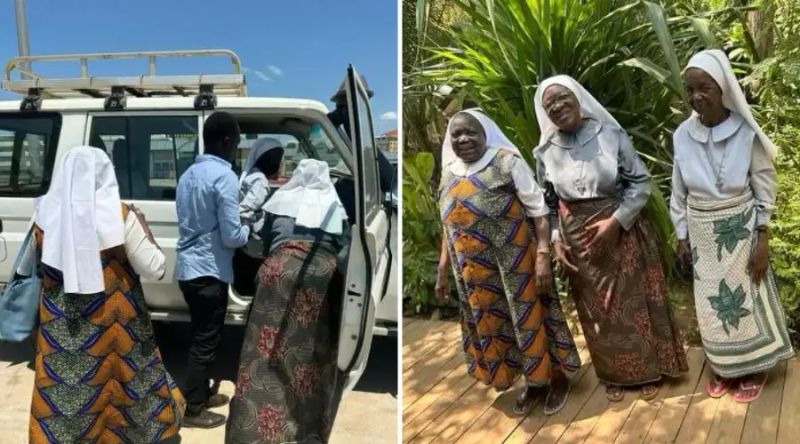
ACI Prensa Staff, May 24, 2023 / 13:30 pm (CNA).
The Vulnerable People Project (VPP), a Catholic human rights organization, evacuated in cooperation with other institutions three nuns caught in the crossfire of the civil war in the Sudanese capital of Khartoum.
On April 29, Sister Christine, one of the nuns in danger, alerted that she and two of her companions had been stranded in the middle of fighting between the Sudanese Armed Forces and the paramilitary Rapid Support Forces.
The VPP and associated organizations not only rescued the Sisters of the Sacred Heart of Jesus — a diocesan congregation originating in South Sudan — but they also reportedly saved some 800 people trapped in the Sudanese capital.
Jason Jones, founder and president of the U.S.-based VPP, reported May 21 that the three nuns had been safely evacuated and are currently in South Sudan.
“By the grace of God, they are now out of the country, in South Sudan, and will soon return to their mother house after receiving checkups and exams at a hospital,” Jones said in a May 23 interview with ACI Prensa, CNA’s Spanish-language news partner.
“Almost 800 people were rescued that day, including the sisters. Unfortunately, during the extraction, a volunteer from a collaborating organization was killed by sniper fire,” he noted.
Images shared by the VPP with ACI Prensa show the nuns in good spirits and health. In addition, in a video one of the sisters, Lucy, thanked God and the organizations involved in the rescue.
“We are grateful to God and the VPP for rescuing us. We will never forget you. We will pray for you,” she said.
Jones said that the nuns were in an area where there was intense shooting and that the situation “was very terrifying” after being trapped.
“An American who often helps the sisters contacted my organization and asked if we could evacuate them, as we have been working with partners in Sudan for 20 years,” he said.
Jones immediately agreed and with his team put together an evacuation plan, considering that two of the nuns were sick. “One didn’t have her diabetes medicine, so she was very weak, and another was fighting malaria.”
“They were old, frail, and the idea of a long journey, which ultimately took 72 hours from start to finish, was terrifying. So our team came and was with them for several days trying to comfort them. We brought them food, money, [and] insulin. But then the building next door to where they were was knocked down by artillery fire, and I think this convinced them that they had to go with our team,” the VPP president recounted.
According to Jones, despite the fact that “it was a great challenge for them, the sisters were very brave and strong, because they were caught between armies accused of heinous crimes and genocide.”
“Despite their old age, their frailty, their illness, the terrifying situation, they were strong enough to be evacuated to a safe place,” he said.
Jones added that the sisters were praying the whole time.
“The sisters continually prayed for us, for the members of our team, because there are many more people to be rescued. As soon as they were evacuated, their first concern was that we wouldn’t quit,” he recounted.
The VPP leader explained that his job as a Catholic organization for the defense of human rights “is to support the most vulnerable people in the world” and “to be there at the moment of the cross.”
“When the world turns dark, then the mystical body of Christ has to be there and make it a priority. We are radically committed to caring for Catholics in Sudan, without forgetting what is happening to Catholics in Nigeria,” he said.
The conflict in Sudan
On April 11, 2019, since the Sudanese army ousted President Omar Hassan Ahmad Al-Bashir following popular protests against him — and after a 30-year rule — military leaders and their civilian counterparts have been at odds.
In a July 2019 power-sharing arrangement between Sudan’s military and civilians, the post-Al-Bashir transitional authorities were tasked with confronting a legacy of abuse and repression alongside a challenging economic crisis.
However, on Oct. 25, 2022, General Abdel Fattah al-Burhan, who was in charge of the Sovereign Council of Sudan, the entity that shared power in the country, staged a coup announcing the dissolution of the council and the civil government, the arrest of political leaders, and the declaration of a state of emergency.
Since then, tensions have increased over the reform of the security forces and within the framework of the negotiations to form a new transitional government.
The de facto military government has been condemned by the international community, including governments and human rights groups.
On April 15, at least 56 civilians were killed and nearly 600 wounded after a clash broke out in Khartoum between the national army led by Al-Burhan and the paramilitary group called the Rapid Support Forces.
Jones charged that the media “are not paying attention to what is happening in Sudan.”
“My team has sent me videos that rival anything seen in the Rwandan genocide, of bodies strewn in the streets, of soldiers crushing the heads of hundreds of people as they lie helpless on the ground,” he concluded.
At least 550 civilians have been killed and nearly 5,000 injured since the April 15 conflict, according to recent data from Sudan’s Ministry of Health.
This story was first published by ACI Prensa, CNA’s Spanish-language news partner. It has been translated and adapted by CNA.
If you value the news and views Catholic World Report provides, please consider donating to support our efforts. Your contribution will help us continue to make CWR available to all readers worldwide for free, without a subscription. Thank you for your generosity!
Click here for more information on donating to CWR. Click here to sign up for our newsletter.




“The Religion of Peace”!